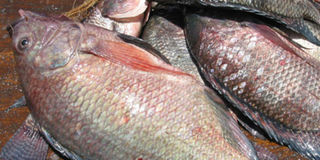Protein-rich food reduces risk of stroke, says study

Fish is a rich source of several food values including protein, vitamins and minerals, which are also essential to maintaining good health. File photo
What you need to know:
For every additional 20 grammes per day of protein that people ate, their risk of stroke decreased by 26 per cent, the researchers found.
Diets rich in protein appear to reduce a person’s risk of stroke, particularly if it is lean animal protein such as fish, a new analysis suggests.
People with the highest amounts of animal protein in their diets were 20 per cent less likely to suffer a stroke, compared with those who ate little to no protein, said study author Xinfeng Liu, of Nanjing University School of Medicine in Nanjing, China.
For every additional 20 grammes per day of protein that people ate, their risk of stroke decreased by 26 per cent, the researchers found.
“If everyone’s protein intake were at this level, that would translate to more than 1.4 million fewer deaths from stroke each year worldwide, plus a decreased level of disability from stroke,” Liu said in a news release from the American Academy of Neurology.
Protective benefits
The researchers concluded that animal protein offers more than twice the protective benefit against stroke as protein from vegetable sources.
Stroke experts cautioned against taking the study’s findings too literally, however.
Many animal protein sources also come with high levels of saturated fats that can increase risk of stroke.
“I do not think this study means the public should run out and start eating burgers and red meat,” said Dr Ralph Sacco, chair of neurology at the University of Miami’s Miller School of Medicine. “Focusing on lean protein consumption and or even vegetable protein is important,” he said.
Fish has been previously linked to reduced stroke risk, while red meat consumption has been shown to increase the chances of suffering a stroke.
Doctors are not sure exactly why protein decreases stroke risk. The nutrient appears to help protect against hardening of the arteries, high blood pressure and diabetes, all of which are risk factors for stroke, Sacco said.
Previous research
The new review looked at previous research on the relationship between protein in the diet and the risk of stroke. Seven studies involving more than 250,000 participants were included in the analysis.
The results, which are published the journal Neurology, accounted for other factors that could affect the risk of stroke, such as smoking and high cholesterol, the study authors said.
The investigators found in their analysis that animal protein reduced stroke risk by 29 per cent, while vegetable protein lowered risk by about 12 per cent.
However, the study only found an association between protein intake and stroke risk because it was not designed to prove a cause-and-effect link.
Protein quality might explain this difference, said Dr Linda Van Horn, a professor of preventive medicine at Northwestern University Feinberg School of Medicine and a past chair of the American Heart Association’s Nutrition Committee.
Animal proteins are considered complete because they contain all the amino acids needed by humans, while most sources of vegetable protein are incomplete, she said.
-HealthDay news




